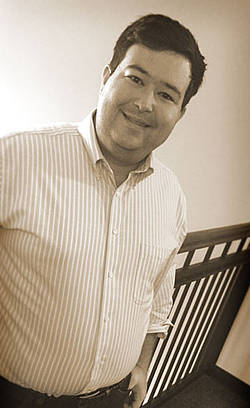
Interview with Donald F. Johnson, 2016 Manuscript Prize Winner
 At the 2016 SHEAR conference, Donald F. Johnson, assistant professor of history at North Dakota State University, received the SHEAR Manuscript Prize for his Northwestern University dissertation, “Occupied America: Everyday Experience and the Failure of Imperial Authority in Revolutionary Cities under British Rule, 1775-1783.”
At the 2016 SHEAR conference, Donald F. Johnson, assistant professor of history at North Dakota State University, received the SHEAR Manuscript Prize for his Northwestern University dissertation, “Occupied America: Everyday Experience and the Failure of Imperial Authority in Revolutionary Cities under British Rule, 1775-1783.”
The Republic (TR): How would you summarize the argument of your dissertation?
Donald F. Johnson (DJ): “Occupied America” argues that everyday experiences of military occupation fundamentally changed Americans’ attitudes towards the British Empire in port cities. Occupations began with high hopes on both sides: city residents who remained expected a return to the prosperity of the pre-Revolutionary British Empire, while soldiers and officials expected a pliant population base eager to their allegiance to the king. Although occupation provided opportunities for many civilians to better themselves socially and financially, however, military rule utterly failed to bring about a restoration of imperial authority. Despite its promise, the lived experience of occupation – material hardships brought on by the army, insults to colonists’ perceived position in the Empire, and mismanagement of civil government ultimately alienated many who had once been among the Empire’s most vehement supporters. Thus, when the British army finally evacuated its posts in American port towns, the majority of civilians were happy to see them go.
TR: What led you to choose this topic to research?
DJ: I was drawn to the topic by watching the failed US occupations of Iraq and Afghanistan in the 200s and early 2010s. Touted as nation-building projects and the use of the military as protectors of civil society, these occupations actually sparked or worsened civil wars as they continued. As a student of Revolutionary America, I wondered whether British military occupation in America may have had the same effect, and, after doing a small exploratory study on occupied Charleston, South Carolina, found a much more interesting story.
TR: Which historians and/or writers most influenced your research?
DJ: My first influence has been my doctoral advisor, Tim Breen, who taught me how to ask hard questions of my sources, how to “read between the lines” of primary documents to find previously unheard voices, and how to think like a historian while remaining relatable to a more general audience. Over the course of my research, my biggest influences have been Franklin Jameson’s conception of the Revolution as a social movement, John Shy’s perceptive insights into the social and political dynamics American Revolutionary War, Gary Nash and Benjamin Carp’s studies of the popular politics of Revolutionary cities, David Waldstreicher and Benjamin Irvin’s work on the connection between social ritual and politics, and Ethan Shagan’s insightful study of popular politics during the English Reformation, although countless other works and minds have also informed my own thinking.
TR: Once your dissertation is published, what do you think your next project will be?
DJ: I’ve got a few projects in mind, but the one that interests me most is an investigation of the Revolutionary War as a transformative event in its own right, rather than simply a War for Independence that followed an already-effected political Revolution. As many scholars have demonstrated recently, the war fundamentally changed the way people in North America thought about their relationship to authority, and these changes did not fall simply along the lines of that elite politicians expected, or their descendants deigned to recollect in their early histories. I’d like to explore how the war itself pushed and twisted the course of the Revolution in different ways, and how taking it seriously as a Revolutionary War, rather than simply a War for Independence, changes our conceptions of that event.
